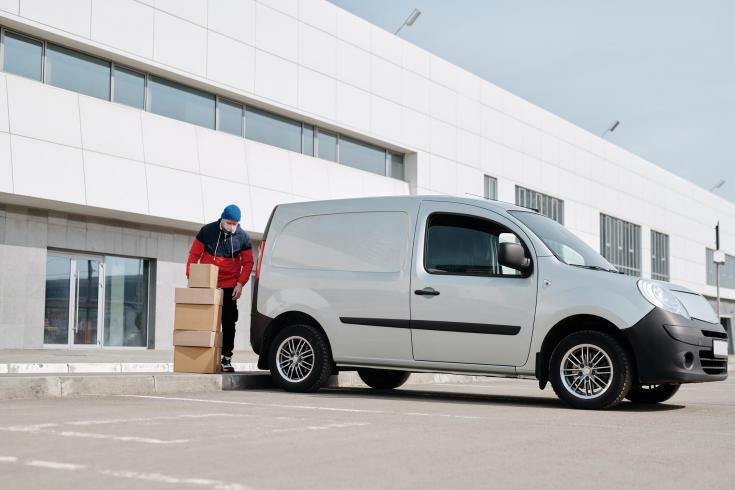Webinar recording: Tackling the urban freight logistics challenge

On 23 March 2021, the Policy Learning Platform hosted a webinar on the topic of tackling the urban freight logistics challenge. The webinar provided an introduction to the challenges of urban logistics and dive into solutions and approaches to overcome the increasing complexity. The webinar outlined the SULP methodology and provided insights in two inspiring good practices from Sweden and Finland.
You can watch the recording and access the presentations below.
Webinar recording
Webinar agenda overview
Navigate to the discussion topics of interest in the webinar agenda overview below.
Moderation and concept by: Katharina Krell and Simon Hunkin, Thematic Experts of Low-carbon economy.
00:02:02 Introduction to the Policy Learning Platform services and topic of urban logistics by Katharina Krell.
00:09:46 Michał Antczak from the City of Warsaw Public Road Authority shared his experience on the Peer Review service.
00:16:21 Keynote speech by Georgia Ayfantopoulou from CERTH on the methodology and approach for developing a SULP.
00:32:35 Presentation by Sami Sahala from Forum Virium Helsinki, on real-time monitoring of parking for city logistics, as identified by the SMART-MR project
00:42:58 Q&A: Collection of data is crucial. How long has that process of data collection taken in Helsinki?
00:44:01 Presentation by Olof Moen from the National Centre for Municipal Co-distribution of Goods (Sweden) on the Växjö Consolidation Centre, identified by the RESOLVE project.
00:57:08 Q&A: You mentioned the mandatory obligation and co-distribution of goods, does this means the distribution is limited to organisations that are working in that approved network? And if so, have Swedish cities not complained that this represents monopoly? And if they have, what would your answer be in terms of that being legally allowed?
00:58:09 Q&A: What kind of goods are part of the consolidation centre?
Panel discussion
00:59:42 Q&A: In what way is it different to develop policies for urban logistics than for instance cycling? Given that it's a logistics is a private sector industry. How should policy makers go about this?
01:07:10 Q&A: How do you overcome the reluctance to cooperate?
01:23:38 Last round of statements from the speakers
Key learnings
The main lessons from the webinar were:
- The urban freight challenge is not going away, and is indeed likely to get worse. The movement of goods in, to and from cities, as well as well as service transport, construction and waste collection will grow corresponding to urban populations and e-commerce. This will cause congestion and pollution, and reduce quality of life with kerbside/pavement parking, noise and safety concerns. Urban authorities should move fast to tackle the challenge, before the private sector further sets the rules of the game.
- Sustainable Urban Logistics Plans aim to tackle these challenges, but take-up remains significantly lower than for Mobility plans: only 25% of the webinar audience represented a city with a SULP, while more than 50% had taken no actions on sustainable logistics. Support is available in the form of the Eltis Guidelines on SULPs and Best Practices, as well as the Novelog Cooperative Business Models and Guidance for Sustainable City Logistics.
- Stakeholder engagement is essential, across the value chain, including public authorities, logistics providers and customers/clients, and they must be involved in working structures and working groups. They need to be engaged to understand the impact of logistics on the city and recognise the need to change.
- Some resistance is to be expected from private companies which have so far been left unregulated and may be concerned about impacts to their efficiency and profit. Although win-win solutions are rare, emphasise the impact of externalities and the need for change to improve urban quality of life, then co-develop solutions. There will always be those willing to make a first move: seek their collaboration and work on a pilot area with a few players to begin with.
- Data provision is vital, but most data related to urban logistics is private and owned by companies. Identify the data owners and incentivise them to provide information. One such example could be making providing data a prerequisite of procurement, licencing or public space allocation. Data will be a key area for future research and projects.
- As in Helsinki, solutions can focus on making life easier for logistics companies. Helsinki has trialled a pilot wherein an app provides information on available parking spaces for logistics, and another that is crowdsourcing information related to deliveries (where to find the right drop-off point, for example). Both can help avoid kerbside parking and speed up delivery stops.
- Public procurement is a powerful tool for change: in Sweden, for the past twenty years, co-distribution of goods has been enabled in more than 45 municipalities through a national framework and replicable business model. Public authorities bundle the orders for all public entities in a municipality, then purchase the goods from various companies but require delivery to be consolidated in a single point and then a single company manages the last stage of distribution to all municipal entities, significantly reducing the number of trips and increasing load factors.
- Authorities need to approach city logistics in the same way they have tackled public transport: be bold, systematic and consistent. Take a long-term view of how you want the city to be and include logistics in it, ensuring it is integrated into transport and land-use plans.
- Last mile delivery by a fleet of light electric vans or cargo bikes is an option in line with a low-carbon mobility vision, and is worth exploring further. A webinar on cargo-bikes for last-mile solutions is planned for September 2021.
- Cities willing to develop new logistics policies are welcome to request a two-day expert peer review from the Interreg Europe Policy Learning Platform, as Warsaw has done recently with good results.
For more information, you can also view the Interreg Europe Policy Learning Platform Brief on Sustainable Urban Logistics.